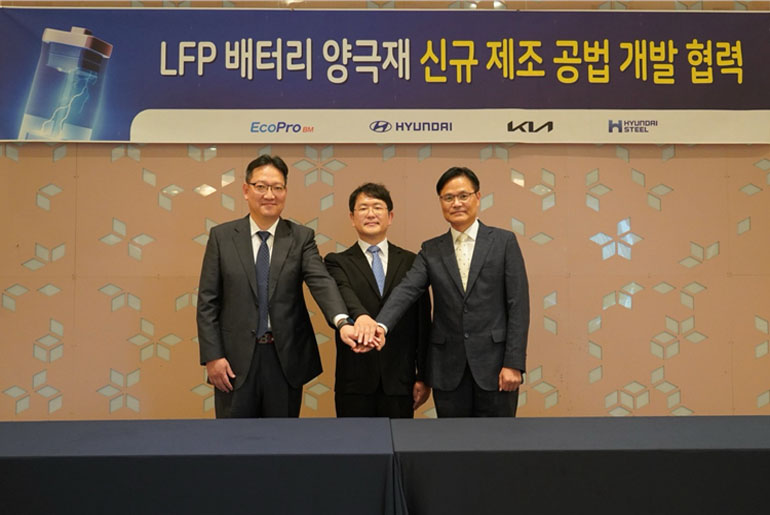Hyundai Motor Company and Kia Corporation are increasing their efforts to improve competitiveness of future electric vehicle (EV) batteries.
Hyundai Motor and Kia have started an effort to create lithium iron phosphate (LFP) battery cathode material. This business, in partnership with Hyundai Steel and EcoPro BM, a cathode material industry leader, intends to directly synthesise materials rather than producing a precursor for LFP battery cathode material manufacture. The Korean Ministry of Trade, Industry, and Energy is supporting this four-year project as part of the ‘LFP Battery Technology Development’ effort.
Soonjoon Jung, Vice President and Head of the Electrification and Driving Materials Development Group at Hyundai Motor and Kia, said,“To meet future demand in the EV market, rapid technological development and effective battery supply chain establishment are essential. Through this project, we aim to reduce import reliance and enhance the technological competitiveness of the country and Hyundai Motor Group by internalizing necessary technologies.”
Traditionally, LFP battery cathode materials are produced by adding lithium to precursor materials like phosphate and iron sulfate. The direct synthesis process simultaneously adds phosphate, iron (Fe) powder and lithium without creating a separate precursor. This eliminates the precursor production step, reducing hazardous substance emissions during manufacturing and lowering production costs.
The direct synthesis process is environmentally friendly and cost-competitive compared to conventional processes. However, to increase production efficiency, ensuring impurity-free and uniformly sized raw materials is crucial.
In collaboration with Hyundai Steel, Hyundai Motor and Kia will develop high-purity fine iron powder processing technology using domestically recycled iron. EcoPro BM will then use this technology to develop directly synthesized LFP battery cathode material using iron powder raw materials.
The aim is to develop LFP cathode material that enables fast charging technology and exhibits high-level charging and discharging performance at low temperatures.
This collaboration carries significance as it connects the steel, battery and automotive sectors. By integrating technology in the LFP battery material field, Hyundai Motor and Kia aim to spearhead advancements in the EV market.
Last year, both Hyundai and Kia announced their active pursuit of enhancing the battery capabilities, performance, safety and cost competitiveness of EVs as part of their long-term strategies.

